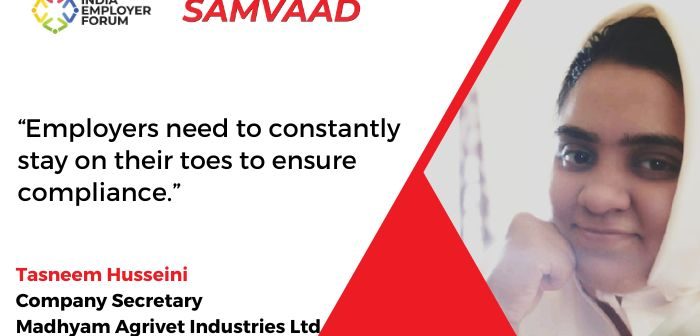Food is one of the major segments of the FMCG sector and is a highly regulated space. Companies need to be in harmony with several regulations and industry standards, including safety regulations, quality measures & standards, and ISO regulations, among others. The foremost responsibility of an FMCG organisation is to maintain quality. This requirement is critical for maintaining consumer trust and investor confidence. In addition, it also allows employers to avoid the severe legal consequences and penalties associated with non- compliance with food safety regulations. Businesses have to manage several aspects, from the direct procurement of agricultural produce to delivering it to the consumer. These include efficient management of product expiry, ensuring consumer safety and satisfaction, and batch management, among others.
In addition to adhering to compliance requirements under the Factories Act and its delegated regulations, businesses need to conduct periodic audits and checks. At KisanKonnect, we maintain the F-E-F-O (First Expiry First Out) approach in how we ensure that highly perishable products can reach the consumer within a set timeframe.
As a startup, how do you ensure compliance processes keep up with business growth, manufacturing and storage capacity expansion, and increased involvement of third-party vendors/ contractors?
As an organisation, it is necessary to develop Standard Operating Procedures (SOPs). These SOPs are then used to train new joiners as well as existing employees who are involved in compliance-related activities. Digital tools are deployed across departments to give timely alerts on regulatory updates and reminders of pending compliances. In addition, key managerial personnel (KMPs) review the compliance status with regular meetings and conduct surprise audits.
How challenging is the Licenses and permissions regime at the union and central level?
Once a license/ permit/ registration has been obtained, several applicable requirements must be met. Whether it is the factory license, any of the FSSAI licenses, the legal metrology license or the direct marketing license, employers need to constantly stay on their toes to ensure compliance with the associated regulations.
How do you ensure that employees across the organisation are aware of the compliances and contribute to the compliance processes?
Employees are given regular training at set periodic intervals as well as when required. Any changes in regulatory requirements, policies, and processes are circulated via internal publications. Digital tools have been a great addition as they compile updates in a single place and assist in conducting compliance audits.
How do you manage the compliance of your contractors?
Contractors/third-party vendors are engaged with contract agreements that specifically determine and guide their activities. From registration to training of contract labourers, the principal employer is responsible for keeping the contractors aware of any changes in laws and regulations. Keeping track of several contractors is difficult, and ensuring that they comply with relevant regulations is challenging. Principal employers can easily lose track of the actions of their contractors, and as such, an SOP, digital tool and policy for dealing with contractors is a must.
Has the tone from the top around compliance changed?
KMPs and top management play a critical role in creating a culture of compliance. The starting point of any compliance programme is the Board and senior management. A culture of compliance is established by building responsibilities in the employees. Regular audits, periodic compliance meetings and reviews foster transparency and accountability. In addition,
incentivising good and proper compliance helps motivate employees. Lower-level management also plays a key role in mitigating the risks of non-compliance.
What should young professionals focus on early in their careers to reach a higher level as governance professionals?
Young professionals should make it a point to be always up-to-date on regulatory and policy developments. They must ensure that compliance is adhered to across the different departments and participate in all forms and types of compliance processes, from registers and records to audits to tests to employee welfare, among others.
CS Tasneem Husseini Bhanpurawala
CS Tasneem Husseini Bhanpurawala, a resident of Thane (Mumbai), joined Prabhat Dairy Limited as an Assistant Company Secretary, where she dedicated approximately 4.5 years of her professional journey. With a total of around 9 years of experience in the field of Secretarial and Legal matters, CS Tasneem possesses the ability to handle tasks with acute professionalism. With a strong professional acumen, she now holds the position of CS & Legal Head at KisanKonnect Group, where she excels in Secretarial and Legal Compliance, including SEBI and RBI Regulations. Throughout her career, she has effectively managed key responsibilities, including overseeing IPOs, Delisting, Buyback processes, and several other significant milestones.
Disclaimer: The opinions and views expressed in this article, including any accompanying data, are the sole responsibility of the author and should not be construed as reflecting the official policy or position of India Employer Forum.




